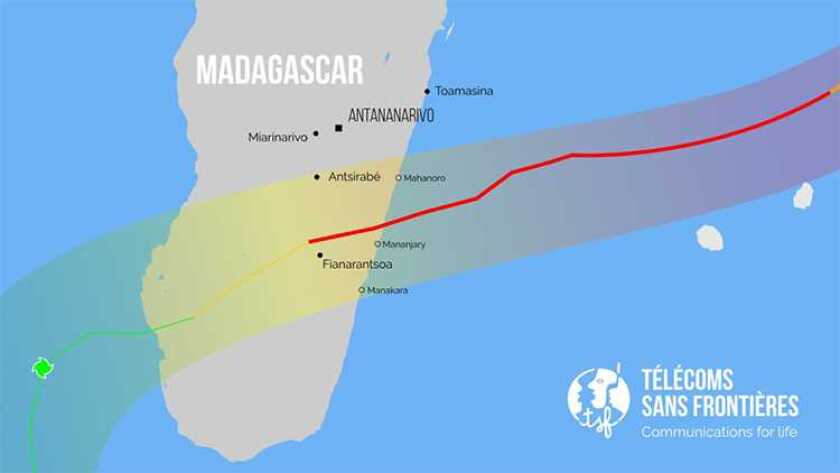The mission comes as TSF marks the 30th anniversary of its foundation, originally as Solidarité Pyrénéenne – Pyrenean Solidarity – which in its first three years, from September 1992 sent 56 humanitarian convoys from Pau in the south of France to help refugees in Bosnia.
This week, working with close coordination with the Madagascan emergency response bodies, a TSF team landed in the capital, Antananarivo.
Florent Bervas, head of mission for TSF in Madagascar, said: “Our emergency telecommunication equipment will contribute to a joint and tailored response to the communication problems caused by the cyclone and thus support the humanitarian assistance for the communities living in the affected areas.”
The cyclone made landfall on the east coast of Madagascar at the weekend, with registered wind gusts of up to 235km/h. Based on the first estimations, more than 600,000 could have been affected, of which more than 50,000 are already displaced.
Madagascar is particularly prone to facing the consequences of climate change and its impact on the rainy season. In January a deadly tropical storm caused at least 50 casualties.
TSF said from its headquarters in Pau, in the French Pyrenees: “Our team is in close coordination with the other humanitarian organisations in order to join the emergency operations as soon as possible after the end of quarantine imposed by the government on any new arrival.”
The organisation was started when three friends, Jean-François Cazenave, Monique Lanne-Petit and Robert Chassagnieux noted what they called “the general indifference towards the massacre of Kurdish refugees in Iraq in 1991”.
A few months later, the association was again in the field following the invasion of Slovenia and Croatia by the troops of the Yugoslavian People’s Army.
“The people who came to us would take out a piece of paper from their shoes with one or more names and phone numbers. They asked us to contact their relatives who were abroad,” said Cazenave, now president of TSF.
Mobile phones did not yet exist, and the only way available at the time was the Mini M, a telephone equipped with a satellite antenna. Solidarité Pyrénéenne managed to get one thanks to the city of Pau.
Solidarité Pyrénéenne decided to intervene in Albania, along the Kosovar border.
“At the foot of the mountain, the Red Cross and charitable organisations were already there to help them. But to our amazement, it was to us that the displaced people were flocking to call. What we had imagined, was proving to be true: their need to communicate was real, and as vital as their need for food or medical care,” said Cazenave.
Eight days later, the first foreign vehicles arrived from France, Germany, the UK, Austria and further afield to pick up their loved ones.
In April 1999, Solidarité Pyrénéenne went back to Macedonia and settled in the north of Skopje, where more than a million people had just been expelled by Serbian leader Slobodan Milosevic.
They set up its one and only satellite phone in the middle of a field, while a gigantic queue of refugees stretched over a kilometre. Cazenave recalled: “We had just invented the first humanitarian telecommunications.”
TSF took over from Solidarité Pyrénéenne in April 1999, as an agency specialising in humanitarian emergency telecommunications. The founders left their previous jobs to fully dedicate themselves to the development of TSF.
Since then, TSF has been involved in more than 150 major crises, providing communication means to more than 20 million beneficiaries and over 850 local and international humanitarian organisations.
Today, according to Sky News, local politician Jean Brunelle Razafintsiandraofa said at least 96 people have died as a result of Cyclone Batsirai.
“The death toll is expected to rise. There are also many victims today who have lost property and have only clothes on their backs. There is no food and no storage to use, no shelter.”
Members of the industry can support TSF in US dollars, euro or British pounds via this link.






